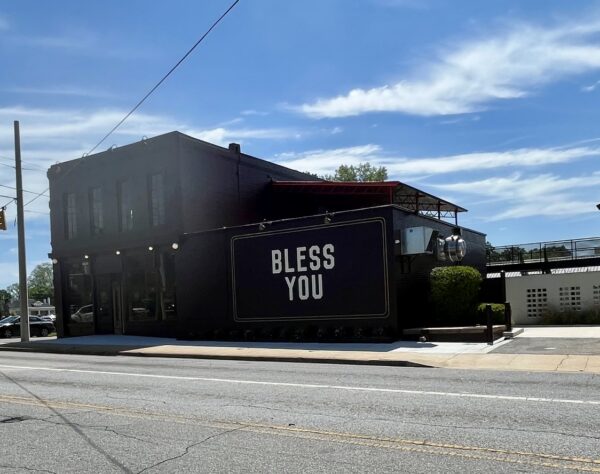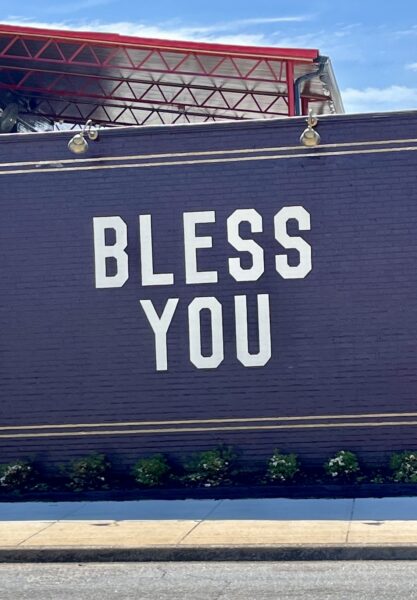 While we were visiting friends in Alabama last week, I was startled to round a corner in downtown Opelika and encounter a HUGE blessing right there on the side of a building. I’ve had the concept of blessings steadily percolating lately in preparation for my upcoming book release in July: Bless Your Heart, and this unexpected blessing walloped me upside the head.
While we were visiting friends in Alabama last week, I was startled to round a corner in downtown Opelika and encounter a HUGE blessing right there on the side of a building. I’ve had the concept of blessings steadily percolating lately in preparation for my upcoming book release in July: Bless Your Heart, and this unexpected blessing walloped me upside the head.
Could this awesome blessing be intended for wild and uninhibited sneezers who frequent the sidewalks of this particular block? Or maybe the fine folks who went to all the trouble of erecting it were issuing a general blanket-blessing propelled by the power of the Almighty?
Hard to say. Either way I found it wonderful!
It’s generally believed that the phrase, “God bless you!” or its modernized shortened version, “Bless you!” is believed to have begun back in the 6th century when Pope Gregory began responding to sneezers with it during the Bubonic plague. At that time, it was generally acknowledged that the sneeze was a sign that you were surely doomed (sadly, death was common due to the plague and lack of medical knowledge). The blessing was meant to send you on your journey to your eternal home with minimal pain and rotting away of your bones.

Plus, the blessing served a double purpose in initiating the (hopefully) divine stifling of the spread of germs from the sneezer to the blesser and others nearby. A shot in the dark, granted, but probably as effective as the glorified hankies we wore over our faces during COVID-19.
As a disease deterrent, seems like it would be better to shout, “God bless ME!” than “God bless you!”
Down through the following centuries, some believed that you’re expelling an evil spirit when you sneeze, and the blessing was to protect you from the angry homeless spirit seeking respite once again in your vulnerable body, causing you sickness and abbreviated life. The sneeze-blessing-long-life concept gradually became adopted all over the world: In German, it’s “gesundheit,” which means literally, “health.” In Russian, it’s “bud zdorov,” which is “be healthy.” The Hindu version translates, “live well” and the Chinese say “bai sui” which means, “may you live 100 years.”
In my new devo, Bless Your Heart, I delve a little more into what “Bless” means based on 1 Peter 3:9 MSG: “Bless—that’s your job, to bless. You’ll be a blessing and also get a blessing.”
 The word bless appears over 500 times in the Bible and can be defined as “to divinely care for.” That plunks our heavenly Father smack dab in the middle of all our blessings, since divine means “from God.” Sacred. Anointed. Intentional. He wants to be intricately involved in blessing our hearts and helping us bless other hearts. Blessing others often involves Christlike characteristics Papa God wants to cultivate in His children (us): joy, kindness, generosity, and patience, to name a handful. Few of us can say these are our forte, but cultivation is what solid growth is all about.
The word bless appears over 500 times in the Bible and can be defined as “to divinely care for.” That plunks our heavenly Father smack dab in the middle of all our blessings, since divine means “from God.” Sacred. Anointed. Intentional. He wants to be intricately involved in blessing our hearts and helping us bless other hearts. Blessing others often involves Christlike characteristics Papa God wants to cultivate in His children (us): joy, kindness, generosity, and patience, to name a handful. Few of us can say these are our forte, but cultivation is what solid growth is all about.
Hey, it’s not always easy to bless hearts. But it’s our job and our joy, so let’s resolve to do it well!
~Copyright Coty 2025, Bless Your Heart: Daily Devotions to Warm Your Heart & Feed Your Soul
So whether you’re asking Papa God to bless your food, or send special care to a sneezer, or protect a friend from harm, my prayer is that you’ll be more aware of the presence and unlimited strength of the greatest Blesser of all time, who is more than happy to spread His blessings around to all who walk with Him, those whom I call Blessed Friends Forever (BFFs).
Until next time, God bless you, dearest BFF. Hugs!


Can’t wait until your book release. I’ve been waiting for it!